The Intel Core i9-9990XE Review: All 14 Cores at 5.0 GHz
by Dr. Ian Cutress on October 28, 2019 10:00 AM ESTCPU Performance: Encoding Tests
With the rise of streaming, vlogs, and video content as a whole, encoding and transcoding tests are becoming ever more important. Not only are more home users and gamers needing to convert video files into something more manageable, for streaming or archival purposes, but the servers that manage the output also manage around data and log files with compression and decompression. Our encoding tasks are focused around these important scenarios, with input from the community for the best implementation of real-world testing.
All of our benchmark results can also be found in our benchmark engine, Bench.
Handbrake 1.1.0: Streaming and Archival Video Transcoding
A popular open source tool, Handbrake is the anything-to-anything video conversion software that a number of people use as a reference point. The danger is always on version numbers and optimization, for example the latest versions of the software can take advantage of AVX-512 and OpenCL to accelerate certain types of transcoding and algorithms. The version we use here is a pure CPU play, with common transcoding variations.
We have split Handbrake up into several tests, using a Logitech C920 1080p60 native webcam recording (essentially a streamer recording), and convert them into two types of streaming formats and one for archival. The output settings used are:
- 720p60 at 6000 kbps constant bit rate, fast setting, high profile
- 1080p60 at 3500 kbps constant bit rate, faster setting, main profile
- 1080p60 HEVC at 3500 kbps variable bit rate, fast setting, main profile
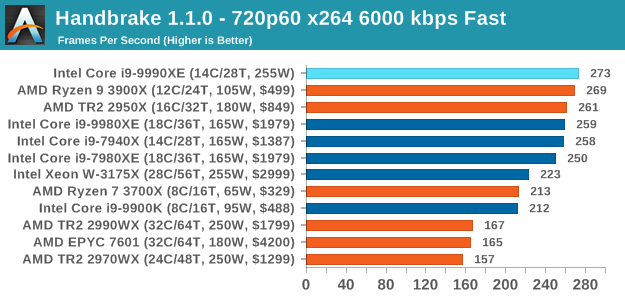
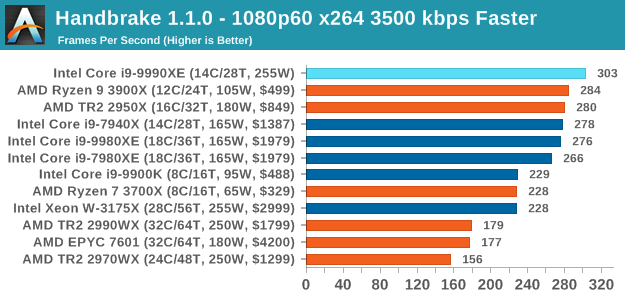
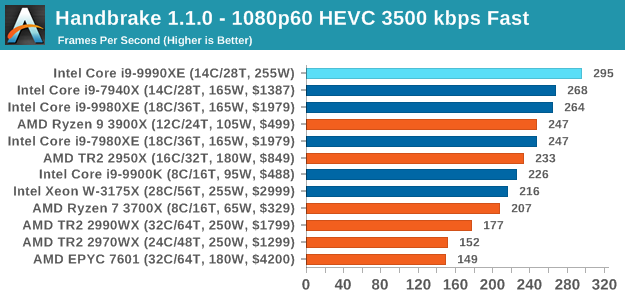
Our encoding tests require a good balance of cores and frequency, and the 5.0 GHz 14-core hardware easily pulls ahead of the 7940X, and shows that having 28 cores isn't always a good thing.
7-zip v1805: Popular Open-Source Encoding Engine
Out of our compression/decompression tool tests, 7-zip is the most requested and comes with a built-in benchmark. For our test suite, we’ve pulled the latest version of the software and we run the benchmark from the command line, reporting the compression, decompression, and a combined score.
It is noted in this benchmark that the latest multi-die processors have very bi-modal performance between compression and decompression, performing well in one and badly in the other. There are also discussions around how the Windows Scheduler is implementing every thread. As we get more results, it will be interesting to see how this plays out.
Please note, if you plan to share out the Compression graph, please include the Decompression one. Otherwise you’re only presenting half a picture.
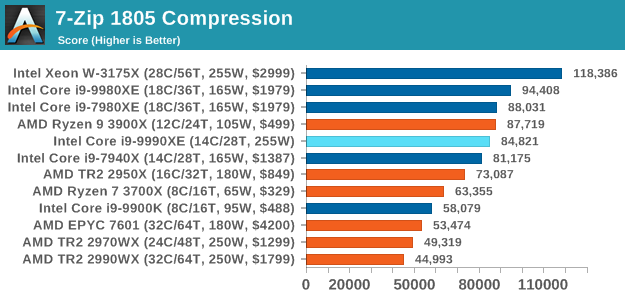
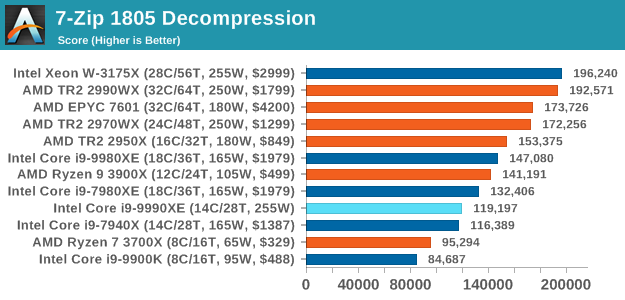
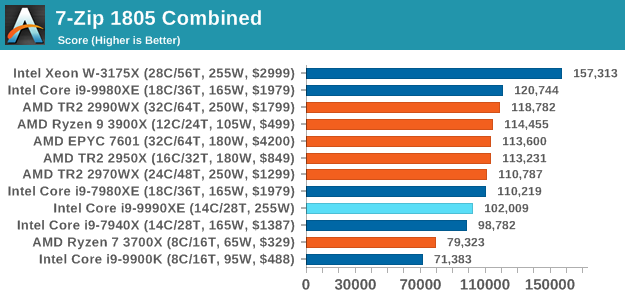
This is where having 28-cores helps, as the extra frequency can't beat some extra cores.
WinRAR 5.60b3: Archiving Tool
My compression tool of choice is often WinRAR, having been one of the first tools a number of my generation used over two decades ago. The interface has not changed much, although the integration with Windows right click commands is always a plus. It has no in-built test, so we run a compression over a set directory containing over thirty 60-second video files and 2000 small web-based files at a normal compression rate.
WinRAR is variable threaded but also susceptible to caching, so in our test we run it 10 times and take the average of the last five, leaving the test purely for raw CPU compute performance.
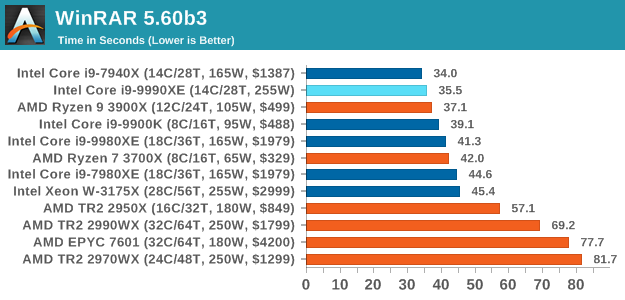
WinRAR is one of our variable threaded tests, so here a mix of cores and frequency helps. Interestingly enough, the 9990XE despite with the higher frequency is slightly slower than the 7940X - this might be a function of the test getting too fast, or the fact that the extra power needed to drive up the cores to peak frequency might be causing additional delays with all the small files.
AES Encryption: File Security
A number of platforms, particularly mobile devices, are now offering encryption by default with file systems in order to protect the contents. Windows based devices have these options as well, often applied by BitLocker or third-party software. In our AES encryption test, we used the discontinued TrueCrypt for its built-in benchmark, which tests several encryption algorithms directly in memory.
The data we take for this test is the combined AES encrypt/decrypt performance, measured in gigabytes per second. The software does use AES commands for processors that offer hardware selection, however not AVX-512.
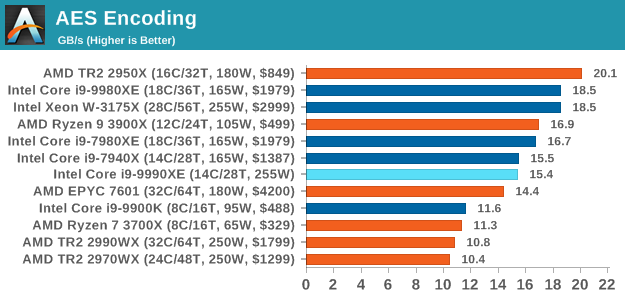










145 Comments
View All Comments
kgardas - Monday, October 28, 2019 - link
Nice comparison, but why is ryzen 3xxx missing from your compilation test? Would be most interesting!Slash3 - Monday, October 28, 2019 - link
...it isn't?Slash3 - Monday, October 28, 2019 - link
Nm, I see what you meant.Flunk - Monday, October 28, 2019 - link
Probably part of Intel's deal to loan them the chip.Retycint - Monday, October 28, 2019 - link
Intel wasn't the one who loaned them the chip. Nice try, thoughjabber - Monday, October 28, 2019 - link
Three or fours years ago this might have been exciting...EdgeOfDetroit - Monday, October 28, 2019 - link
I love all the hate from AMD fanbois here who don't understand that for some things, single thread speed is king. And that apparently didn't read the article long enough to see the completely valid application for these yet felt justified in slamming Intel for selling it. Not surprisingly, those were the first comments, as they didn't have to read the article before commenting.ET - Monday, October 28, 2019 - link
I love the Intel fanboys, who must post such a comment even before any AMD fan had said anything, just because they know that the value of money on that thing is atrocious and that it loses to a 12 core AMD consumer CPU is several tests.Retycint - Monday, October 28, 2019 - link
I mean, nobody is buying Lamborghinis based on their cost-to-perf ratio....AMD is irrelevant in this scenario because it doesn't satisfy the same needs. Not every CPU had to be mass-market oriented
nandnandnand - Monday, October 28, 2019 - link
There's nothing to hate. Intel Core i9-9990XE isn't a real product.